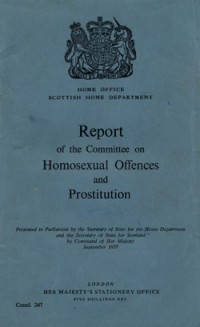Archive for the ‘Wolfenden’ Tag

In 1957, the Wolfenden Committee, after three years of private hearings in the Home Office, produced its report recommending a change in the law, legalising private homosexual activity between consenting adults aged over twenty-one. The committee, formed in 1954, was headed by a former public school headmaster and university vice-chancellor, and included Tory politicians, a senior official in the Girl Guides and a judge. When Wolfenden later discovered that his own son was gay he wrote asking him to keep out of his way and to wear rather less make-up.
The committee, however, had taken evidence from Peter Wildeblood, among other declared homosexuals. Prosecuted for gross indecency, Wildeblood had declared openly and unashamedly in court that he was a homosexual or, in the language of the day, an invert, and demanded the right to be treated with respect. He declined to apologise for his indecent behaviour. His language was very far from the gay pride rhetoric of more recent decades, but it was clear and dignified:
I am no more proud of my condition than I would be of having a glass eye or a hair lip. On the other hand, I am no more ashamed of it than I would be of being colour-blind or of writing with my left hand.
He pointed out that Lord Montagu, the bisexual old Etonian who would go on to become famous for his national motor museum at Beaulieu and his co-founding of English Heritage, had done patriotic service in the Grenadier Guards and that Montagu’s co-accused cousin, Pitt-Rivers, had also served bravely in the war, while he himself had served as a meteorologist in Africa. They were all, apart from their sexuality, entirely normal members of the upper middle-class Establishment, about as different in from the Cambridge spies in their views as it would be possible to be. Since homosexuality was, then as now, spread throughout society, some of the Establishment was gay, too.
By 1957, the attitude of the country as a whole towards homosexuality seemed to have changed. There was a feeling that the prosecution’s tactics used against Montagu, Wildeblood and the others, which included forging an entry in a passport, illegal tapping of phones, grooming and intimidating ‘witnesses’ and searching without warrants, were underhand and unfair. Added to this, the growing hostility towards all forms of government meddling which had contributed to the downfall of the Attlee Government, was beginning to extend to private lives. When Wildeblood was released from prison, he found his working-class neighbours in Islington were cheerily friendly. When Montagu was released from Wakefield prison, he got a similar reception. This was, however, by no means a universal shift, especially among their own social circles. Out to lunch at the fashionable Mirabelle Restaurant in London’s West End, he recalled:
…one or two of the neighbouring tables disapproved. The atmosphere became unpleasant and remarks were made which were obviously meant to be overheard with intent to wound.
At this point, however, the then leader of the Opposition, Hugh Gaitskill, who was also lunching there, came to the rescue:
He could see perfectly well what was going on. After a while, he laid down his napkin and crossed the room to our table. “How nice to see you back,” he said, holding out his hand, which I shook with surprise and gratitude. The action silenced the surrounding hostility.
There was continued hostility to homosexuals, but the so-called permissive society of the sixties was already being forged by public reaction in the late fifties to cases such as these. For the time being, the law-makers disagreed. In the first debates on homosexual law reform, the Home Secretary, Maxwell-Fyfe, said he did not think the country would wear such a change. Had he been present with Hugh Gaitskill in the Mirabelle restaurant, he might have realised that he himself was already out of date.
Source:
Andrew Marr (2007), A History of Modern Britain. Basingstoke: Macmillan.

